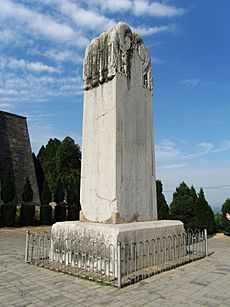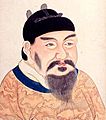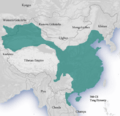Wu Zetian facts for kids
Quick facts for kids Wu Zetian武則天 |
|||||||||||||||||
|---|---|---|---|---|---|---|---|---|---|---|---|---|---|---|---|---|---|
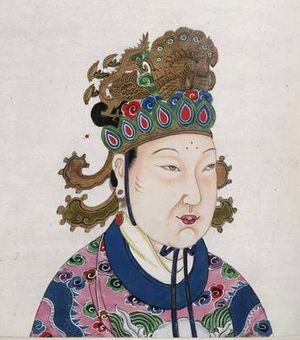
Wu Zetian depicted wearing 18th century Ming dynasty clothing taken from An 18th century album of portraits of 86 emperors of China, with Chinese historical notes. (British Library, shelfmark Or. 2231)
|
|||||||||||||||||
| Empress regnant of China | |||||||||||||||||
| Reign | 16 October 690 – 21 February 705 | ||||||||||||||||
| Coronation | 16 October 690 | ||||||||||||||||
| Predecessor | Dynasty established (Emperor Ruizong as Emperor of the Tang Dynasty) |
||||||||||||||||
| Successor | Dynasty abolished (Emperor Zhongzong as Emperor of the Tang dynasty) |
||||||||||||||||
| Empress dowager of China | |||||||||||||||||
| Tenure | 27 December 683 – 16 October 690 | ||||||||||||||||
| Empress consort of China | |||||||||||||||||
| Tenure | 22 November 655 – 27 December 683 | ||||||||||||||||
| Born | 17 February 624 Lizhou, Tang China |
||||||||||||||||
| Died | 16 December 705 (aged 81) Luoyang, Tang China |
||||||||||||||||
| Burial | Qianling Mausoleum | ||||||||||||||||
| Spouse | |||||||||||||||||
| Issue |
|
||||||||||||||||
|
|||||||||||||||||
| House | Wǔ (武) | ||||||||||||||||
| Dynasty |
|
||||||||||||||||
| Father | Wu Shiyue | ||||||||||||||||
| Mother | Lady Yang | ||||||||||||||||
| Religion | Buddhism | ||||||||||||||||
| Wu Zetian | |||||||||||||||||
|---|---|---|---|---|---|---|---|---|---|---|---|---|---|---|---|---|---|
| Traditional Chinese | 武則天 | ||||||||||||||||
| Simplified Chinese | 武则天 | ||||||||||||||||
|
|||||||||||||||||
| Wu Zhao | |||||||||||||||||
| Chinese | 武曌 | ||||||||||||||||
|
|||||||||||||||||
| Wu Hou | |||||||||||||||||
| Chinese | 武后 | ||||||||||||||||
|
|||||||||||||||||
| Tian Hou | |||||||||||||||||
| Chinese | 天后 | ||||||||||||||||
|
|||||||||||||||||
Wu Zetian (born February 17, 624 – died December 16, 705), also known as Wu Zhao, was the only female emperor in Chinese history. She ruled the Tang dynasty from 665 to 705. At first, she ruled through others, then from 690, she ruled on her own.
From 665 to 690, she was the empress consort (wife of Emperor Gaozong of Tang). After his death, she became empress dowager, ruling through her sons, Emperors Zhongzong and Ruizong. Later, she started her own Wu Zhou dynasty and became the empress regnant.
During her 40-year rule, China grew much larger and became a powerful nation. Its culture and economy improved, and there was less corruption in the government. Wu Zetian was removed from power in a coup and died a few months later.
She is seen as one of China's greatest emperors. Her strong leadership made China very powerful. She expanded the Chinese empire far into Central Asia. She also fought wars on the Korean Peninsula.
Wu Zetian also changed society. She supported Taoism and Buddhism. She also improved education and literature.
Wu Zetian created a network of spies. This helped her gather information about the empire. She also reformed the imperial examination system. This system helped find talented people for government jobs. This meant that skill, not family connections, became more important. She also supported building projects like the Longmen Grottoes.
Contents
Early Life and Rise to Power
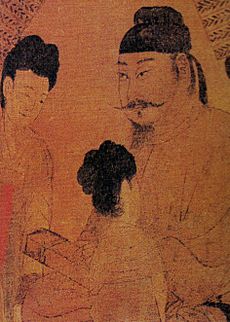
Wu Zetian's family came from Wenshui County in China. Historians are not sure exactly where she was born. Some say it was Wenshui, others Lizhou (modern-day Guangyuan), or Chang'an (modern-day Xi'an).
She was born in 624. Her father, Wu Shiyue, was a successful timber merchant. Her mother was from the powerful Yang family. Wu Zetian's family was wealthy.
Her father encouraged her to read and learn. This was unusual for girls at that time. Wu Zetian studied many subjects. These included politics, writing, literature, and music.
At age 14, she became a concubine (a lesser wife) of Emperor Taizong of Tang. She worked as a secretary there. This allowed her to continue her education. She was given the title of cairen, a rank for imperial consorts. When she left for the palace, her mother cried. Wu Zetian told her, "How do you know that it is not my fortune to meet the Son of Heaven?" Her mother then understood her ambition.
Emperor Taizong did not seem to favor Consort Wu much. When he died in 649, his son, Li Zhi, became Emperor Gaozong of Tang.
After Taizong's death, Wu was sent to Ganye Temple. She was expected to live there as a Buddhist nun. However, Li Zhi visited her. He found her even more beautiful and clever. He decided to bring her back to the palace as his own concubine.
Becoming Empress Consort
In 655, Wu became Tang Gaozong's new empress consort (húanghòu). Empress Wu became very powerful in politics. She had a great influence over the Emperor.
In 656, Emperor Gaozong named Empress Wu's son, Li Hong, as the crown prince. Soon after, Empress Wu gained more control in the court. She appointed officials who supported her.
In 657, Empress Wu convinced Emperor Gaozong to have two capitals. Luoyang became a capital alongside Chang'an. She also began to remove officials who had opposed her.
To help her family, she had the Wu clan listed as important in the "Great Families" records. This went against old traditions. In 659, she suggested opening the Palace Exam to more people. This allowed talented people from lower classes to become government officials. This helped reduce the power of the old noble families.
In 660, Emperor Gaozong became ill. He suffered from headaches and vision problems. He started having Empress Wu make decisions on daily government matters. People said Empress Wu was quick and understood many things. She made good decisions. Emperor Gaozong began to rely on her more and more. Her authority soon equaled his. From this point, Empress Wu was the main power behind the throne.
By 664, Empress Wu was very involved in governing the empire. She was making most of the important decisions. From 665, she would sit behind a screen during imperial meetings. She issued her own orders, calling them "emperor edicts." She even wore the yellow robe of an emperor. This was very unusual for an empress.
Wu wanted to make her power more official. In 674, she argued that if the emperor was called "Son of Heaven," his wife should be "Heaven Empress." This connected her rule to a divine right. In 675, she made her rule popular with "twelve decrees." These were proposals for better government and people's welfare.
As Emperor Gaozong's illness worsened, he thought about making Wu a formal regent. But officials feared she would take full control. So, he did not formally make her regent. Wu continued to rule with him as powerful monarchs until his death in 683.
Before he died, Gaozong gave imperial power to Li Zhe, one of their sons. Wu became the empress dowager and regent. She kept the real power.
Empress Dowager and Regent
After Emperor Gaozong died, Wu became empress dowager. She gained full control over the empire. In 684, her son Li Zhe became Emperor Zhongzong. But he only ruled for six weeks.
Emperor Zhongzong's wife, Empress Wei, wanted power like Wu. Zhongzong also started making decisions that went against Empress Dowager Wu. He appointed his father-in-law as prime minister. He also gave a high position to his wet nurse's son.
A chancellor named Pei Yan reported this to Empress Dowager Wu. She then removed Emperor Zhongzong from power. She replaced him with her youngest son, Li Dan, who became Emperor Ruizong. Emperor Zhongzong was sent away. Empress Dowager Wu then used her power even more strongly.
Wu made her youngest son, Li Dan, the emperor. But she was the true ruler. She did not hide behind a screen. Her rule was fully recognized. Ruizong never lived in the imperial quarters. He did not attend imperial events. He was like a prisoner. All matters of the empire were decided by Empress Dowager Wu.
She changed the names of government offices. She also made Luoyang an equal capital with Chang'an. She expanded her family's ancestral shrine.
Soon, a rebellion started in Yang Prefecture. It was led by Li Jingye. He was unhappy about his exile. The rebellion gained support. But Li Jingye moved slowly. Empress Dowager Wu sent an army. The rebellion was crushed.
By 685, Empress Dowager Wu began to use secret mailboxes. People could secretly report on others. She suspected many officials were against her. This led to secret police officials gaining power. They made false accusations and executed many people.
In 688, Wu called important members of the Tang imperial family to Luoyang. The princes worried she planned to harm them. They plotted to resist her. But their plans were not ready. Wu's forces quickly crushed their small rebellions. Wu used this chance to arrest many members of the Li family. Many officials and Li family members were killed in the following years.
In 690, Wu took the final step. She became the empress regnant of the new Zhou dynasty. She took the title Huangdi (Emperor). Chinese tradition did not allow a woman to be emperor. But Wu Zetian was determined. She continued to use strict measures to control opposition.
Historians, even those who disliked her, said she was a capable ruler. She was good at choosing skilled people for government jobs.
Reign as Empress Regnant
In 690, Wu had Emperor Ruizong give the throne to her. She then started the Zhou dynasty. She became the imperial ruler.
Soon after, she made Buddhism more important than Taoism. She built temples and honored monks. She also honored her own ancestors.
The early part of her rule had strong control measures. But these became less strict over time. She was known as a capable and careful ruler. She was admired for choosing good officials.
Many of Wu's actions were popular. They helped her gain support. She ruled during a time when China was doing well. The economy was growing. People's lives were improving. She made sure farmers could work their own land. She used a system to fairly divide land. She also helped the lower classes with relief efforts. She allowed more common people to join the government. She also gave good promotions and pay raises to lower-ranking officials.
Wu used her military skills to strengthen her position. She used a system where soldiers were also farmers. This helped her keep a strong army at a lower cost. She expanded the empire into Central Asia. However, efforts against Tibet were less successful.
Wu Zetian used the imperial examination system to find talented people. These were often poor people or those without powerful backgrounds. This helped her keep control.
In 699, Wu was getting old. She worried about peace between her family and the Li family after she died. She made them all swear an oath to each other.
Changes to the Imperial Examination System
Wu Zetian greatly changed the imperial examination system. This system was used to find educated and talented men for government jobs. Before Wu, only a small number of candidates could take the tests. The tests checked reading, writing, and knowledge of Confucianism.
Wu expanded the pool of candidates. She allowed commoners and gentry, who were previously not allowed, to take the test. In 693, she made the examination system much more important. This gave people from the North China Plain more chances in government. It reduced the power of the old noble families from the northwest. Successful candidates became an important group in her government.
Religion
Buddhism and Legitimacy
Wu Zetian used Buddhist ideas to support her rule. She wanted to show that she had the right to be empress. In 690, she had monks write a special text. It was called the Commentary on the Meanings of the Prophecies About the Divine Sovereign in the Great Cloud Sutra.
This text was based on an old Buddhist scripture. It described a conversation between the Buddha and a goddess. In the story, the Buddha said the goddess would be reborn as a woman. This woman would rule a country. Wu's supporters spread this text widely. They said it proved Wu was meant to be the empress. They said she was a bodhisattva (a wise being). Wu also said she was the reincarnation of two male Buddhist gods. She used these ideas to overcome the traditional rules against women ruling.
Sacred Rituals
Wu Zetian also took part in important religious ceremonies. These included rituals on Mount Song and Mount Tai. In 666, she performed sacrifices to heaven and earth. This was after Emperor Gaozong. It was very unusual for an empress to do this. This act linked Wu to China's most sacred traditions. It showed she had the Mandate of Heaven, the right to rule.
Literature and Culture
North Gate Scholars
Toward the end of Gaozong's life, Wu hired talented officials. They were called the "North Gate Scholars." They wrote many works for her. These included Biographies of Notable Women and Guidelines for Imperial Subjects. Wu used their advice to balance the power of other officials.
The "Twelve Suggestions"
Around 675, Wu made 12 suggestions for the government. One was to add the works of Laozi to imperial university studies. Another was to have a three-year mourning period for a mother's death. Emperor Gaozong liked her ideas and adopted them.
Modified Chinese Characters
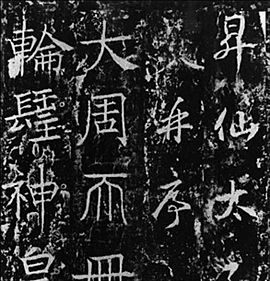
In 690, Wu's cousin's son, Zong Qinke, created new Chinese characters. These were meant to show Wu's greatness. She adopted them. She chose one, Zhao (曌), as her formal name. This character combined "light" or "clarity" (明) and "sky" (空). It suggested she was like light shining from the sky.
Later that year, people asked her to take the throne. Emperor Ruizong offered to take Wu's family name. On August 18, 690, she agreed. She changed the state's name to Zhou. She claimed her family came from the ancient Zhou dynasty. She became the empress regnant. Ruizong was made crown prince. This was how the Tang dynasty was paused, and Wu became the first (and only) woman to rule China as empress.
Poetry
Wu's court was a center for writing and poetry. Forty-six of her poems are in the Quan Tangshi (Collected Tang Poems). Many of her writings were for political reasons. But one poem shows her sadness after her mother died.
Her court also produced other works. One was the Zhuying ji (Collection of Precious Glories). It had poems by famous writers of her time. Wu also supported scholars. She founded an institute to create the Collection of Biographies of Famous Women.
Removal from Power and Death
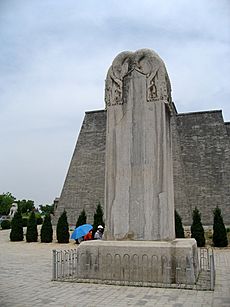
In late 704, Wu Zetian became very ill. Only a few close people were allowed to see her. This led to rumors that they were plotting to take over. Officials repeatedly accused them of treason.
By early 705, Wu was seriously ill again. Some officials and generals planned a coup. On February 20, they killed the people they believed were plotting. They surrounded Wu's residence. They told her that the plotters had been executed. They then forced her to give the throne to her son, Li Xian.
On February 21, an order was issued in her name. It made Li Xian regent. On February 22, another order passed the throne to him. On February 23, Li Xian officially became emperor again. The next day, Wu was moved to a palace. She was still honored with a special title. On March 3, the Tang dynasty was restored. The Zhou dynasty ended.
Wu died on December 16, 705. According to her last wish, she was no longer called empress regnant. Instead, she was called "Empress Consort Zetian Dasheng." In 706, her son Emperor Zhongzong buried her with his father, Emperor Gaozong. They were buried at the Qianling Mausoleum, near Chang'an.
Modern Depictions
Television
- Portrayed by Petrina Fung in the 1984 Hong-Kong TV series Empress Wu.
- Portrayed by Angela Pan in the 1985 Taiwanese TV series The Empress of the Dynasty.
- Portrayed by Liu Xiaoqing in the 1995 Chinese TV series Wu Zetian, in the 2007 TV series The Shadow of Empress Wu and in the 2011 TV series Secret History of Empress Wu.
- Portrayed by Gua Ah-leh in the 2000 Chinese TV series Palace of Desire.
- Portrayed by Qin Lan in the 2001 Chinese TV series Love Legend of the Tang Dynasty.
- Portrayed by Alyssa Chia in the 2003 Chinese TV series Lady Wu: The First Empress.
- Portrayed by Lü Zhong in the 2004 Chinese TV series Amazing Detective Di Renjie and its sequels Amazing Detective Di Renjie 2, Amazing Detective Di Renjie 3 and Mad Detective Di Renjie.
- Portrayed by Siqin Gaowa in the 2006 Chinese TV series Wu Zi Bei Ge.
- Portrayed by Yang Geum-seok in 2006–2007 KBS TV series Dae Jo Yeong.
- Portrayed by Rebecca Chan in the 2009 Chinese TV series The Greatness of a Hero.
- Portrayed by Yin Tao, Liu Xiaoqing and Siqin Gaowa in the 2011 Chinese TV series Secret History of Empress Wu.
- Portrayed by Wang Li Ke in the 2011 Chinese TV series Meng Hui Tang Chao.
- Portrayed by Kara Hui in the 2011 Chinese TV series Women of the Tang Dynasty and in the 2015 TV series Heroes of Sui and Tang Dynasties 5.
- Portrayed by Zhang Ting in the 2011 Chinese TV series Beauty World.
- Portrayed by Liu Yuxin in the 2012 Chinese TV series Secret History of Princess Taiping.
- Portrayed by Fan Bingbing in the 2014 Chinese TV series The Empress of China.
- Portrayed by Sheren Tang in the 2014 Chinese TV series Cosmetology High.
- Portrayed by Ruby Lin in the 2014 Chinese TV series Young Sherlock.
- Portrayed by Sophie Wu in the 2015 episode of Horrible Histories.
- Portrayed by Jiao Junyan in the 2017 Chinese TV series Legendary Di Renjie.
- Portrayed by Yong Mei in the 2021 Chinese TV series Luoyang.
Films
- Portrayed by Gu Lanjun in the 1939 Chinese movie The Empress Wu Tse-tien.
- Portrayed by Li Lihua in the 1963 Hong-Kong movie Empress Wu Tse-Tien.
- Portrayed by Carina Lau in the 2010 Chinese-Hong Kong movie Detective Dee and the Mystery of the Phantom Flame, its prequels Young Detective Dee: Rise of the Sea Dragon in 2013 and Detective Dee: The Four Heavenly Kings in 2018.
Video Games
- Wu appears in the mobile game Fate/Grand Order as an Assassin class servant.
- Wu appears in the turn-based strategy games Civilization II, Civilization V and Civilization VI as a leader of the Chinese civilization.
- Wu appears as a character in the mobile game Law of Creation as a front-row tank.
- Wu appears as a minister earned in the mobile game Call Me Emperor after getting first place in the cross server intimacy event.
- Wu appears in the mobile game Rise Of Kingdoms as a legendary Chinese civilization Commander.
- Wu appears as the highest-paying symbol in Wu Zetian, a slot machine published by Realtime Gaming
Novels
- Wu is the main character, known as Mei, in the historical fiction novel Moon in the Palace and its sequel The Empress of Bright Moon, both by Weina Dai Randel.
- Xiran Jay Zhao's novel, Iron Widow, is a new version of Wu's life. The author said she reimagined Wu as a teenage peasant girl who gains access to giant fighter mechas.
- Wu is the main character and narrator of Shan Sa's historical novel Impératrice, published in France in 2003. It was translated into English as Empress in 2006.
Images for kids
-
Epitaph for Yang Shun, general to Empress Wu Zetian, China, Luoyang, 693, limestone, Royal Ontario Museum
-
The Giant Wild Goose Pagoda, originally built in 652, it collapsed and was rebuilt in 701–704 during the reign of Wu Zetian; the present structure is largely the same as it was in the 8th century, although it used to be three stories taller before the damage caused by the 1556 Shaanxi earthquake
See also
 In Spanish: Wu Zetian para niños
In Spanish: Wu Zetian para niños
 | Sharif Bey |
 | Hale Woodruff |
 | Richmond Barthé |
 | Purvis Young |




